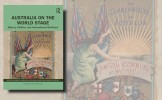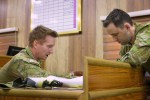Search
Using the filters to the left, click your selection, it will become bold and filter the results, click it again to remove that filter.
Dr. Risa Brooks is Allis-Chalmers Professor of Political Science at Marquette University, Wisconsin, USA, a non-resident fellow in the Future Security program at New America and non-resident Senior Associate at the Center for Strategic and International Studies. She is the author of Shaping Strategy: The Civil-Military Politics of Strategic Assessment (Princeton University Press), co-editor (with Elizabeth Stanley) of Creating Military Power: The Sources of Military Effectiveness (Stanford University …

Dr Jack Watling Senior Research Fellow, Land Warfare, Royal United Services Institute Dr Watling provides a powerful assessment on the profession of arms and delves into the human elements of war and contemporary battlefields. He covered four things: Firstly, address what is the relationship between technology and professionalism. Secondly, suggest some aspects of the human face of battle which are changing and which we need to confront and be prepared for. Thirdly, address what that means for …

Alan Ryan is the Executive Director of the Australian Civil-Military Centre, which is responsible for developing Australia’s national capabilities to prevent, prepare for, and to respond more effectively to conflicts and disasters overseas. From 2006 to 2011 he served as the Principal of the Centre for Defence and Strategic Studies at the Australian Defence College . Prior to this appointment he was the senior adviser on strategy, operations, intelligence and international issues to the Minister for …

Dr Michael Ryan is a Senior Lecturer in the School of Electrical Engineering at ADFA. He has twenty years experience in battlefield communications and information systems.He is a graduate of the Royal Military College, Duntroon; the Telecommunications Engineering Management Course (UK); and of the Australian Army Command and Staff College. Throughout his military career, he has held a range of regimental and staff appointments. He holds Bachelor, Masters and Doctor of Philosophy degrees in electrical …
Dr. Risa Brooks is Allis-Chalmers Professor of Political Science at Marquette University, Wisconsin, USA, a non-resident fellow in the Future Security program at New America and non-resident Senior Associate at the Center for Strategic and International Studies. She is the author of Shaping Strategy: The Civil-Military Politics of Strategic Assessment (Princeton University Press), co-editor (with Elizabeth Stanley) of Creating Military Power: The Sources of Military Effectiveness (Stanford University …

History, Politics and International Relations London, Routledge, 2023, pp 234 ISBN: 9781032117171 Editors : Bridget Brooklyn, Benjamin T. Jones, and Rebecca Strating Reviewed By : Pearl Nunn Comprehensive yet accessible, challenging and probing; Australia on the World Stage is the ideal introduction to Australian foreign relations from before colonisation to the twenty-first century. The three co-editors include: Bridget Brooklyn, lecturer in Australian history at Western Sydney University and …

Abstract In 2021–2022, the 1st Battalion, Royal Australian Regiment (1 RAR), experimented to develop a ‘disrupt force’ consisting of light infantry augmented with uncrewed aerial systems and ground vehicles. This group operated ahead of other forces to report on the opposing force, but also ambushed enemy reinforcement and withdrawal routes. The disrupt force actively attacked and degraded opposing forces and their plans, isolating objectives and setting the conditions for friendly combat teams to conduct …
Dr Pearl Nunn is a Lecturer in History at the University of Newcastle, NSW. Nunn completed her History PhD in 2023, entitled “Visible and Vocal: Black Women in Eighteen Century Britain, c.1707-1834”. She has taught in various areas, including Australian History, Transatlantic History and European History. … Pearl …
Conceptual Reframing of the Operational Level of War The traditional conceptual model that divides war into strategic, operational, and tactical levels remains influential within Western military doctrine. While strategic decisions shape political aims, the tactical level encompasses direct battlefield engagements. Between these extremes lies the operational level of command, tasked with linking strategic intent to tactical actions. [1] Recently, this operational level has come under scrutiny, particularly …

Major Matthew Jones is an Army Reserve infantry officer and civilian Paediatric Surgeon currently serving as SO2 Strategic Analysis at the Australian Army Research Centre. He has commanded at a company level, posted as an instructor on the Combat Officers’ Advanced Course, and deployed on multiple domestic operations. A recent graduate of the Australian Command and Staff Course, he holds a PhD in paediatric surgery, a Doctor of Medicine and a Master of Surgery, among several other tertiary qualifications. …

